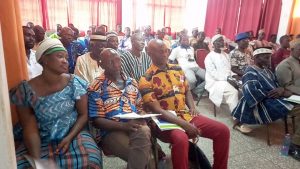Joseph Edwin Yelkabong, LEAN Project Manager
Many communities across Ghana have and are still experiencing some negative effects of on-going climate change.
Some communities have experienced unexpected downpours in huge volumes that have led to flooding, which have destroyed properties and taken human lives, as a result of changes in the climate.
In the Upper East Region for example, there is only one raining season and the rest is dry season, unfortunately, climate change is causing a change, even when the raining season comes, the rainfall patten and volume of water are not good good enough for farming.
Communities in the region seem to be experiencing more drought than rainfall, which is affecting the majority peasant farmers.
To help reduce and possibly reverse this situation, World Vision Ghana has initiated a project dubbed, Landscapes and Environmental Agility across the Nation (LEAN) in 25 communities in the Kassena – Nankana West District in the Upper East Region of Ghana. The over aim of the project is to train communities to address land degradation and deforestation.

A section of the participants
The four-year project is working with stakeholders such as community faith leaders, opinion leaders and farmer groups to conserve biodiversity, build climate resilience, as well as reduce emissions from land-use changes to improve livelihoods.
Speaking at an engagement session of a capacity workshop in Paga, the beneficiary communities indicated that since the introduction of the project two years ago, majority of their landscapes have regained their vegetation cover.
Batabasu Adonawura, a 37-year-old mother of four children, said she used to fell whole trees for firewood, but after meeting with World Vision Ghana, she now knows how to manage the trees around her farmland for a good economic benefit.
She explained: “… I used to cut these trees (pointing at shea nut trees) for firewood. But when I joined this project, these same trees I was cutting down are now supporting me. Not only that, the grass I used to burn for no reason, my animals now depend on them as food.”
Reverend John Kennedy Nchor Atigre, also a beneficiary, noted that the project since its implementation has redirected him fuse the environment into his preachings, saying, “… I talk about how God wants us, I mean we human beings to take care of the environment for our own good an to the glory of the creator. This is exactly what this project is all about.
I and my congregation are now ambassadors of LEAN, because we are reaping the benefits. So, I will appeal that the project should get more support, so that more communities in the Upper East Region also benefit.”
The Project Manager of LEAN, Joseph Edwin Yelkabong, however, explained that, World Vision Ghana will continue to work with the communities and establish participatory landscape management structures.
“…that will facilitate easy uptake of integrated landscape management technologies and innovations.” The Project Manager noted.
He stressed that though there were some efforts at addressing degradation and deforestation, the effectiveness and the availability of resources were lacking on the part of some actors, for which reason the Landscapes and Environmental Agility across the Nation was started to directly support these communities to scale up on their efforts at attaining climate resilience.
Mr. Yelkabong assured that LEAN will use the remaining years of the project to strengthen community-level capacity building, build landscape performance management framework and as well strengthen their access to improved market incentives.
The project is funded by the European Union and implemented by World Vision Ghana, Rainforest Alliance, Tropenbos Ghana, and Ecocare Ghana.
From Ebo Bruce-Quansah, Paga


